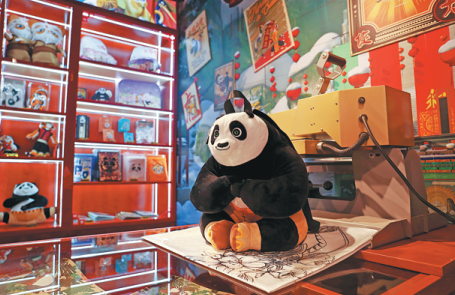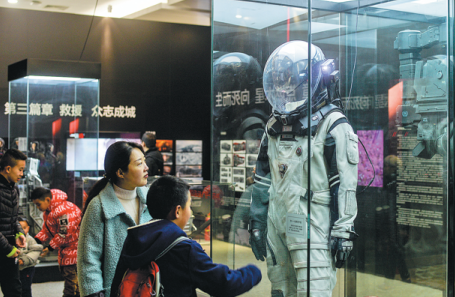Movie industry roars back with robust recovery
Record revenues in the wake of the Spring Festival holiday signal a turnaround for the sector. Xu Fan reports.
Matt William Knowles, an actor from the United States who has played in many Chinese movies and TV series, is increasingly busy, thanks to China's revitalized film industry.
Opening with a record-breaking Spring Festival box-office bonanza in January, the domestic movie market is seeing a strong recovery after a slowdown that resulted from the COVID-19 outbreak.
As of March 1, the country's total box-office receipts had reached 14 billion yuan ($2 billion), almost half last year's 29.9 billion yuan, according to Beacon, a film information aggregator.
The month following the Spring Festival holiday is traditionally considered a slow time because of the lack of major movie releases. However, the period from Jan 28 to Feb 26 grossed 5.96 billion yuan, the highest for the month since the pandemic started, Beacon said.
That means Knowles is receiving more job offers. Currently juggling two projects, the veteran actor has been traveling between Shanghai and Baishan, a small city in the northeastern province of Jilin, spending a few days at each location while shooting the two different tales.
One is director Yao Xiaofeng's spy series Chang Feng Po Lang (Braving the Wind and Waves), in which Knowles portrays a German military consultant. The other is Winter and Lion, a drama set during the War to Resist US Aggression and Aid Korea (1950-53), in which he plays an American officer.
"The acting opportunities are definitely increasing since the market has awoken," he said, adding that he received many calls about new roles a few months ago while he was filming for director Xu Zhanxiong's Xing Chen Da Hai (The Ocean of Stars), a movie about a group of patriotic students at Shanghai University.
"China's film industry is back in full force. It is not opening slowly at all — it is booming again," Knowles said.
For most industry insiders, the Year of the Rabbit has hopped off to a promising start. Statistics from the China Film Administration, the top industry regulator, show that the domestic market raked in 10 billion yuan in the first month of the year, making it the highest-grossing January of all time.
With China optimizing its pandemic policies toward the end of last year, the late-January Spring Festival holiday became the first opportunity for a raft of big movies to vie for the attention of ready-to-return film enthusiasts.
Almost 68 percent of the January takings came during the weeklong Spring Festival holiday, which saw the release of several movies, most featuring big budgets and stellar casts.
Propelled by the popularity gained during the holiday, iconic director Zhang Yimou's historical suspense Full River Red has earned 4.47 billion yuan so far, putting it at the top of this year's box-office charts. Director Guo Fan's sci-fi The Wandering Earth II, a prequel to the original movie, has taken second spot, followed by the animated feature Boonie Bears: Guardian Code in third, while spy thriller Hidden Blade is fourth.
The two other festival movies are Deep Sea, an experimental animated feature that explores the inner world of a girl with depression, and Five Hundred Miles, a comedy about a young man who accidentally exchanges his soul with a notorious lawyer.
Diverse offerings
Major Hollywood movies are also making a comeback. The first Marvel movie to be released on the Chinese mainland after a three-year hiatus is Black Panther: Wakanda Forever, followed by Ant-Man and the Wasp: Quantumania.
Meanwhile, A Guilty Conscience, a Hong Kong satirical comedy that examines societal problems, is one of the latest movies to make waves and recently topped the all-time box-office charts in the city.
Industry analysts said the range of movies is richer and more diverse this year, and filmmakers have done a good job of catering to the interests of different groups.
Huo Jianqi, an award-winning director and a member of the 14th National Committee of the Chinese People's Political Consultative Conference, said the recovery of the Chinese film industry is heartening.
"With China optimizing its pandemic prevention measures, many cinemas have reopened and some high-quality movies have been released, resulting in the return of large audiences. Additionally, the film industry's artistic creativity is thriving once again," he said.
He added that China has more than 80,000 movie screens, the largest number in any country, signaling that the domestic market still has enormous potential. That could encourage Chinese filmmakers — who once struggled during slow periods — to regain confidence and produce excellent work.
Huo said the genres of major films during the Spring Festival season have been more diverse — including suspense, historical, romance, sci-fi, comedy and animation — indicating that the domestic industry has matured and directors have paid more attention to respecting the market.
Huangfu Yichuan, also a member of the 14th CPPCC National Committee and editor-in-chief of the monthly magazine Contemporary Cinema, said the Spring Festival period is usually seen as a barometer of annual box-office takings, and predicted that total movie ticket revenues this year may reach 50 billion yuan, based on previous figures.
Zhi Feina, a professor at the Chinese National Academy of Arts, said the domestic market is undergoing a revitalization, which indicates that people who are passionate about the cinematic industry have chosen to stay in China and the sector has maintained its strength, despite the challenges that resulted from the COVID-19 pandemic.
Longer running times
Most industry insiders contacted by China Daily said some of the holiday blockbusters spent one or two years in post-production, far longer than regular movies in pre-pandemic times.
This was partly due to the comparatively bleak market at the time, but also because it allowed more time to polish and refine each project.
As a testament to those efforts, the average length of holiday movies is 130 minutes, a far longer duration than almost any other films released during previous Lunar New Year holidays.
Considered a trailblazer in promoting homegrown sci-fi movies, The Wandering Earth II runs for a whopping 173 minutes — significantly longer than the first movie, which lasted 125 minutes during its premiere in 2019, and 137 minutes in a rescreened version in 2020.
According to some domestic media outlets, the movie's 3,000-plus special-effects scenes persuaded Xuzhou Construction Machinery Group, a heavyweight manufacturing giant, to sponsor 42 sets of 61 types of heavy machinery to be used as props, and more than 400 sets of components and workshop props. It also assigned 319 staff members to participate in the production.
Chen Maolin, a veteran director, praised the success of The Wandering Earth franchise — its first installment grossed 4.7 billion yuan in 2019, while the second has so far raked in 3.9 billion yuan — as an indication that China's movie industry has achieved remarkable development in cinematic technologies.
"As a genre, science fiction movies represent the level of a country's film production. From Louis Koo's Warriors of Future to The Wandering Earth II, the emergence of these hardcore domestic sci-fi films has given Chinese filmmakers the confidence to catch up with the world's leading level," he said.
The first Wandering Earth movie had 75 percent of its visual effects made by Chinese artists, but the proportion rose to 90 percent for the second movie. Other hardcore sci-fi works, such as the popular Chinese live-action TV series Three-Body, adapted from Liu Cixin's Hugo Award-winning novel, also relied heavily on Chinese teams to create props and digitize special-effects footage, industry insiders said.
Yao Dianna, a post-production supervisor who was educated and employed in New Zealand, said China's visual effects industry has made rapid progress in recent years as a result of market expansion and an increase in talent.
"A number of young film professionals who were educated abroad have returned to China since the early 2010s, as evidenced by the fact that most major Chinese studios have 20 percent or more of their staff with such backgrounds," she said.
Yao added that the returnees' fluency in English makes it easier for them to absorb advanced experience from foreign filmmakers.
New opportunities
Despite China's huge movie market, many experts believe that the domestic film industry has not yet developed a fully mature business model. They said profits should not only come from ticket sales, but also from related sectors, such as merchandising, to maximize revenue and create a sustainable model.
Chen said a probable positive signal for change in the industry was that The Wandering Earth II set a record in its merchandising fundraising, a regular market strategy which sells yet-to-be-produced products to reduce the risk of uncertainty.
For instance, if a film is not popular or the design of the products is not appealing, this strategy can help mitigate potential losses.
The Wandering Earth II started its fundraising presale on Jan 22 with a goal of 100,000 yuan. However, the response from enthusiastic fans was overwhelming, and the presale surpassed 100 million yuan within one week, generating the highest revenue for a Chinese movie's merchandise in history.
Moreover, due to the high demand, the companies making the merchandise had to stop the presale, as they had already reached their annual production capacities.
Deemed a breakthrough in film merchandise, which typically consists of small, low-cost items such as keychains, stickers and stuffed toys, the sci-fi blockbuster's best presold item was a replica of a dog-shaped robot that features in the movie. The robot has more than 1,800 parts and is controlled by a smartphone app.
In addition to The Wandering Earth II, the merchandise of other popular movies such as Boonie Bears: Guardian Code and Deep Sea has also sold well, indicating the huge potential of the once-niche market.
Zhi, from the Chinese National Academy of Arts, said the merchandise sales for Spring Festival blockbusters this year far exceeded expectations, but also showed that the domestic merchandise business is still in the primary phase.
Noting that Hollywood relies on long-running franchises such as Star Wars to earn more profits than box-office revenue from merchandise and create an enduring influence among fans, Zhi said Chinese filmmakers should plan ahead and start designing merchandise when a movie project is launched.
"With a greater range of cultural products associated with a movie franchise, the development of intellectual property will become more sustainable, resulting in a more mature industry," she said.
Two years ago, China unveiled a 14th Five-Year Plan (2021-25) for the domestic film sector, with the aim of becoming a major force in the global movie industry and deepening the impact of Chinese films on the global cinema landscape.
With the recovery of international tourism, those efforts are being revived. At the recent 73rd Berlin International Film Festival, 15 Chinese films were nominated in various categories, including two titles — the animated feature Art College 1984 and The Shadowless Tower, based in Beijing — that were nominated in the main competition category.
As a successful example of Chinese movies going abroad, The Wandering Earth II has been released in many countries, including the US, the United Kingdom and New Zealand, and is scheduled to reach more overseas markets, such as Russia and South Africa.
Speaking about the resurgence of Chinese movies on the international stage, Huo said it is inspiring to see both commercial blockbusters and art house films gaining attention overseas, indicating a significant leap forward in Chinese cinema's decadeslong efforts to expand abroad.
Emphasizing the importance of China's goal to become a strong film power by 2035, Huangfu said that it will require an increase in the number of annual productions and the quality of domestic movies, which will necessitate various improvements, including the cultivation of more talent and the development of cinematic technology.
He said Chinese filmmakers should root their creations in real life and portray the authentic emotions of the Chinese people, thus gaining empathy from the majority of audiences and forming a sustainable, healthy film ecosystem.
Knowles, the US actor, said: "The film industry has always been like surfing in the ocean. Sometimes you catch a big wave and sometimes you are waiting for the next one to come in … what China is offering now is bigger and bigger waves, so you had better be ready."
Contact the writer at xufan@chinadaily.com.cn



















